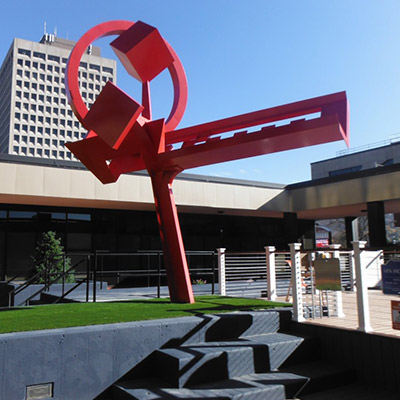By Barb Van Atta
A Celebration of Life will be held Saturday (Oct.28) for Broome County Arts Council Heart of the Arts (HOTA) Lifetime Achievement Award winner Albert Pearce “Al” Hamme. The jazz musician, 84, died peacefully at his Endwell home on Sept. 10.
Hamme founded the jazz program at Harpur College, now Binghamton University, in 1964 and was its director for 33 years. He also was Director of the Concert Band and Wind Chamber Music Program (1967-1989), Director of Undergraduate Studies (1975-1985) and Chair of the Music Department (1980-1985).
At the time of his death, he was a professor emeritus in the BU Music Department, which released the following statement: “Al was a consummate musician who remained active in our area and across New York State throughout his life. His legacy includes the many students that he inspired, the musicians with whom he collaborated and the continuing strength of our jazz program.”
Hamme directed the Cornell Jazz Ensemble for six years and was chosen to be the first artistic director of the School of Jazz Studies for the NYS Summer School of the Arts program (1985-1991).
A woodwind (saxophone, clarinet, flute) artist, producer, arranger and composer, Hamme performed and recorded with many jazz and big band greats. Along with the Rev. William Carter, he was a founding member of the Presbybop Quartet, which specializes in jazz in church settings. He founded Music Unlimited in 1974 and directed that until 2011. He most recently played with the Music Unlimited Little Big Band, Swing Street Jazztet and the Mason Warrington Orchestra.
In 2012, the Binghamton Jazz Festival at July Fest presented a Lifetime Achievement Award to Hamme for his “contributions to the performance, education and appreciation of jazz music in the Greater Binghamton area.” He received a star in 2019 on the Wall of Fame at the Broome County Forum Theatre in Binghamton.
When Hamme’s HOTA Lifetime Achievement Award was announced in 2014, he expressed surprise to Broome Arts Mirror: “I’m still not sure that I should be the first jazz performer to be chosen for this award even though I’ve spent a lot of time and energy in the promotion of the various forms of jazz. I did it in part because I felt that the art form needed more exposure in our geographical area, but I was also doing it so that I would get a chance to perform with better and even well-known musicians, those who possessed superior technical facility and the unique talent to worship the muse on the highest of planes.”
Hamme was nominated by BCAC for “his 50 years of contributions to the knowledge and enjoyment of jazz in our community, its schools and colleges, and his encouragement and development of succeeding generations of performers of jazz, America’s unique music form.”
“The teaching of music was my vocation” he told BAMirror, “but performance, organization and the experiences that accompany these tasks were not only my hobby but my passion.”
Hamme supported jazz by facilitating Jazz Jams at the Schorr Family in Johnson City. He also was a longtime active member of the service organization Sertoma. Those wishing to make a charitable gift in his memory are encouraged to consider The Harpur Jazz Ensemble at Binghamton University, Binghamton Sertoma Club or The Jazz Fund at the Schorr Family Firehouse.
Hamme is survived by his wife, Shelagh; children, and grandchildren.
The Celebration of Life will be held from 2 to 6 p.m. Saturday (Oct.28) at Genegantslet Golf Course, 686 State Highway 12, Greene. Friends are invited to share “Al stories.” We at BAMirror offer the following, also from Hamme’s HOTA interview in 2014:
Jazz was always part of Al Hamme’s upbringing. His father played saxophone and clarinet with big bands. His private teachers had their own combos. But the “a-ha” moment came when he was in junior high and starting to get asked to play gigs.
“One New Year’s Eve, I filled in for my father and was amazed at the way in which the older players could not only read music, but also played very well without it,” he recalled. “When midnight came, the band played Auld Lang Syne, and, after a few choruses, the tempo picked up, and each member in turn stood up to play solos. I had no idea what was happening, but when the leader pointed to me, I panicked and shook my head in a negative fashion. He insisted, so I finally stood up and tried to play like the rest of the musicians had done before me. Well, I never felt such a surge of freedom!”




































